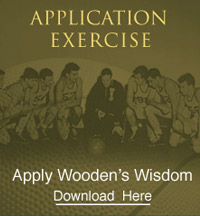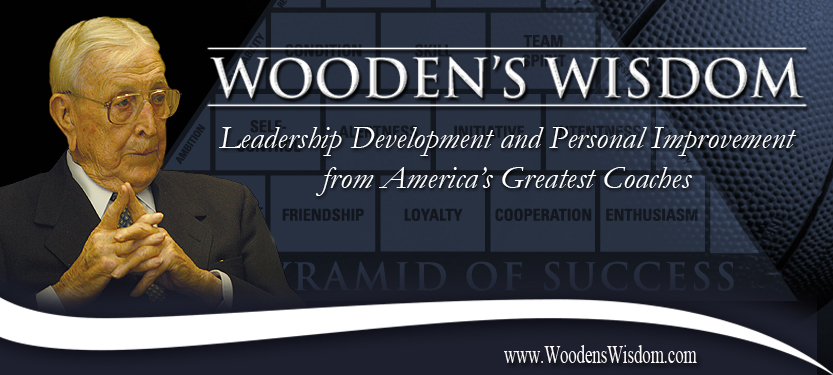|
COACHING PROGRESS
In order to achieve consistent continuous improvement you should have incremental goals and be coaching progress for individual team members. The goal may not always be achieved but progress or lack thereof should be evaluated.
Coach Wooden had individual coaching conferences and drills for various players at each practice. He scheduled twenty to thirty minutes each day before the formal start of team practice where the players would practice on their own and the coaches would pull aside different individuals on different days to work on specific weaknesses or the development of skills unique to their position. Exactly what each individual would work on was documented in detail in the written practice plan and could vary from day to day. What was worked on was the result of ongoing written observations the coaches made on their daily practice card during previous practices or games This segment was called: Individual Attention. The organized team practice followed and was limited to two hours (actually shorter later in the season).
Coach limited his total practice time to two hours and thirty minutes and he felt Individual Attention was so important that he set aside thirty minutes from organized team practice for this individual Coaching of Progress. The key is to coach individual progress and evaluate results in short increments. This is straight forward for an athletic coach since there is practice or games most days.
Coaching individual progress is more challenging when running a business because coaching individual progress means you sometimes have to interrupt the production process to coach individuals. If there is a lot of pressure on production output it becomes more challenging because the person is charge is fearful of losing production time when coaching individual team members.
If you coach individual progress efficiently with incremental goals the improvement in performance will far outweigh lost production time. An individually coached team member who works 39 hours a week in production with one hour of weekly of individual coaching will far outperform the worker who works forty hours a week with no individual coaching.
A great company or team does not just do year end annual reviews with their team members which often disappoint both parties. A review is looking in the rear view mirror after the fact when it is too late to change the results.
Great companies post daily results, constantly coach individual progress, have weekly informal brainstorming, do mid-month coaching sessions and monthly performance evaluations. These companies have yearend celebrations instead of yearend reviews.
Coach Wooden's daily Individual Attention period before each practice greatly contributed to the team's consistent daily improvement.
What is your regularly scheduled and executed program for providing individual team members with realistic short term incremental goals and coaching in the areas they need to improve? How do you measure the results? Do you change the individual’s process if progress is not being made? I don’t have the time is not a productive answer.
Yours in Coaching,
Craig Impelman
|


COACH'S FAVORITE POETRY AND PROSE
Paul Revere's Ride
Listen my children and you shall hear
Of the midnight ride of Paul Revere,
On the eighteenth of April, in Seventy-five;
Hardly a man is now alive
Who remembers that famous day and year.
He said to his friend, "If the British march
By land or sea from the town to-night,
Hang a lantern aloft in the belfry arch
Of the North Church tower as a signal light,-
One if by land, and two if by sea;
And I on the opposite shore will be,
Ready to ride and spread the alarm
Through every Middlesex village and farm,
For the country folk to be up and to arm."
Then he said "Good-night!" and with muffled oar
Silently rowed to the Charlestown shore,
Just as the moon rose over the bay,
Where swinging wide at her moorings lay
The Somerset, British man-of-war;
A phantom ship, with each mast and spar
Across the moon like a prison bar,
And a huge black hulk, that was magnified
By its own reflection in the tide.
Meanwhile, his friend through alley and street
Wanders and watches, with eager ears,
Till in the silence around him he hears
The muster of men at the barrack door,
The sound of arms, and the tramp of feet,
And the measured tread of the grenadiers,
Marching down to their boats on the shore.
Then he climbed the tower of the Old North Church,
By the wooden stairs, with stealthy tread,
To the belfry chamber overhead,
And startled the pigeons from their perch
On the sombre rafters, that round him made
Masses and moving shapes of shade,-
By the trembling ladder, steep and tall,
To the highest window in the wall,
Where he paused to listen and look down
A moment on the roofs of the town
And the moonlight flowing over all.
Beneath, in the churchyard, lay the dead,
In their night encampment on the hill,
Wrapped in silence so deep and still
That he could hear, like a sentinel's tread,
The watchful night-wind, as it went
Creeping along from tent to tent,
And seeming to whisper, "All is well!"
A moment only he feels the spell
Of the place and the hour, and the secret dread
Of the lonely belfry and the dead;
For suddenly all his thoughts are bent
On a shadowy something far away,
Where the river widens to meet the bay,-
A line of black that bends and floats
On the rising tide like a bridge of boats.
Meanwhile, impatient to mount and ride,
Booted and spurred, with a heavy stride
On the opposite shore walked Paul Revere.
Now he patted his horse's side,
Now he gazed at the landscape far and near,
Then, impetuous, stamped the earth,
And turned and tightened his saddle girth;
But mostly he watched with eager search
The belfry tower of the Old North Church,v As it rose above the graves on the hill,
Lonely and spectral and sombre and still.
And lo! as he looks, on the belfry's height
A glimmer, and then a gleam of light!
He springs to the saddle, the bridle he turns,
But lingers and gazes, till full on his sight
A second lamp in the belfry burns.
A hurry of hoofs in a village street,
A shape in the moonlight, a bulk in the dark,
And beneath, from the pebbles, in passing, a spark
Struck out by a steed flying fearless and fleet;
That was all! And yet, through the gloom and the light,
The fate of a nation was riding that night;
And the spark struck out by that steed, in his flight,
Kindled the land into flame with its heat.
He has left the village and mounted the steep,
And beneath him, tranquil and broad and deep,
Is the Mystic, meeting the ocean tides;
And under the alders that skirt its edge,
Now soft on the sand, now loud on the ledge,
Is heard the tramp of his steed as he rides.
It was twelve by the village clock
When he crossed the bridge into Medford town.
He heard the crowing of the cock,
And the barking of the farmer's dog,
And felt the damp of the river fog,
That rises after the sun goes down.
It was one by the village clock,
When he galloped into Lexington.
He saw the gilded weathercock
Swim in the moonlight as he passed,
And the meeting-house windows, black and bare,
Gaze at him with a spectral glare,
As if they already stood aghast
At the bloody work they would look upon.
It was two by the village clock,
When he came to the bridge in Concord town.
He heard the bleating of the flock,
And the twitter of birds among the trees,
And felt the breath of the morning breeze
Blowing over the meadow brown.
And one was safe and asleep in his bed
Who at the bridge would be first to fall,
Who that day would be lying dead,
Pierced by a British musket ball.
You know the rest. In the books you have read
How the British Regulars fired and fled,--
How the farmers gave them ball for ball,
From behind each fence and farmyard wall,
Chasing the redcoats down the lane,
Then crossing the fields to emerge again
Under the trees at the turn of the road,
And only pausing to fire and load.
So through the night rode Paul Revere;
And so through the night went his cry of alarm
To every Middlesex village and farm,--
A cry of defiance, and not of fear,
A voice in the darkness, a knock at the door,
And a word that shall echo for evermore!
For, borne on the night-wind of the Past,
Through all our history, to the last,
In the hour of darkness and peril and need,
The people will waken and listen to hear
The hurrying hoof-beats of that steed,
And the midnight message of Paul Revere.
Henry Wadsworth Longfellow
|
